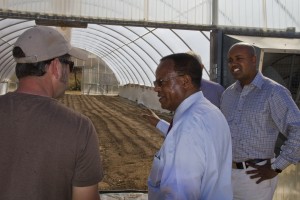 |
| Garden on Thursday with Project PPEP state training coordinator Zeke Gebrekidane (right) and Bill Stern the manager of the garden. |
Sitting in early fall in a lush Sahuarita yard — surrounded by a garden, fruit trees and towering cottonwoods — an Ethiopian dignitary had a hard time believing he was in a desert.
Taye Atske Selassie, Ethiopian director general for the Americas/foreign affairs ambassador, got a first-hand look Thursday at successful rural development in Sahuarita’s Valverde neighborhood.
Hosting Selassie was John Arnold, CEO of Project PPEP Inc., the Portable Practical Educational Preparation organization that since 1967 has been working to improve the quality of rural life through education, job training and placement, housing development and more.
Project PPEP is one of the foremost world-development grassroots organizations in this country, Arnold says.
The 13-home Valverde neighborhood and water cooperative was a self-help project PPEP started in 1981, along with one in Continental and in Arivaca Junction’s Lakewood neighborhood.
All 13 homeowners at Valverde received a modest federal HUD grant to build their homes, said Edgar Granillo, a PPEP board member whose father, Diego, was one of the original 13 homeowners on Calle Valle Verde.
“Everyone helped build the 13 homes. No one moved in until all 13 were finished,” Granillo recalls.
Selassie, who has worked at the Ethiopian Embassy in Washington, D.C., and was Ethiopia’s consulate general in Los Angeles, spent the day in Southern Arizona touring several PPEP projects, including the PPEP TEC Charter High School in Tucson, the Arivaca Community Garden sustainable organic farming project, as well as the Tree of Life Rejuvenation Center in Patagonia.
Selassie’s goal was to learn from PPEP’s many years of experience, everything from what their physical projects are like to the technical aspects, he told the Green Valley News.
He was focusing on “how they organize and operate, and how they lead the cooperatives” to see what value can be added to Ethiopia’s existing cooperatives.
Microfinancing in Ethiopia has helped rural residents purchase seeds to grow crops, buy animals to haul the harvest to market, and to establish a place to sell their goods, Selassie says.
While visiting the Valverde home of Diego Granillo, Arnold pointed out that the 13 lots all cover one acre so the homeowners have room to grow a garden and, if they choose, to raise some animals.
The original Valverde homeowners all worked for Farmers Investment Co. in its pecan orchards, Edgar Granillo says. They were living in company housing, which was tied to their jobs, before they had the opportunity through PPEP to get federal funding and help build their own homes with a community well.
PPEP’s Microbusiness Housing Development Corp. has a long history of serving rural Arizona. Programs include self-help homeownership, as well as down payment assistance, owner-occupied home repair programs, and assisting rural communities to build infrastructure such as water and sewer improvements.
PMHDC also provides technical assistance to community housing development organizations under a contract with HUD and for the development of farmworker housing under a contract with the USDA.
“This is very productive,” Selassie says. “We’re seeing what we can learn.”
http://www.gvnews.com/
http://www.gvnews.com/

No comments:
Post a Comment